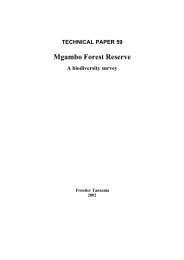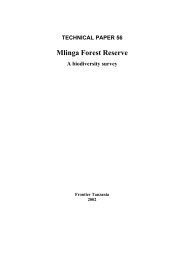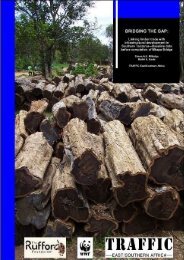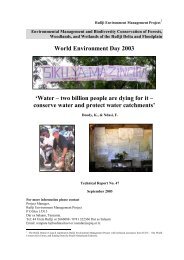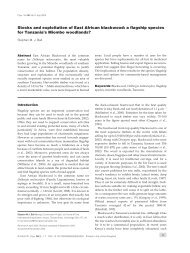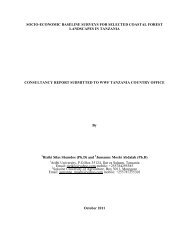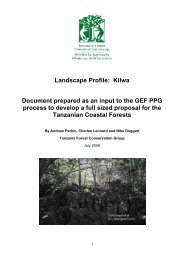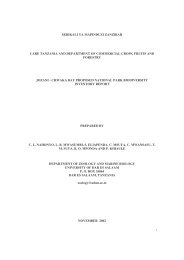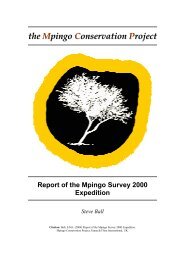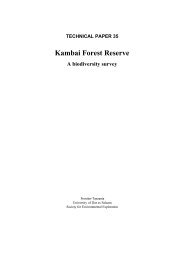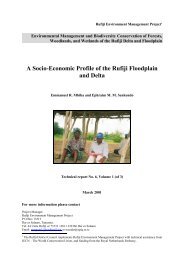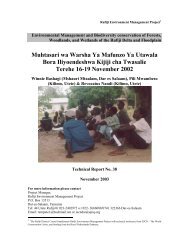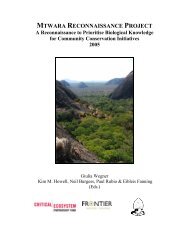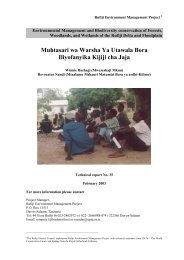Eastern Africa Coastal Forest Programme: Regional Workshop ...
Eastern Africa Coastal Forest Programme: Regional Workshop ...
Eastern Africa Coastal Forest Programme: Regional Workshop ...
Create successful ePaper yourself
Turn your PDF publications into a flip-book with our unique Google optimized e-Paper software.
EASTERN AFRICAN COASTAL FOREST PROGRAMME<br />
REGIONAL WORKSHOP REPORT<br />
NAIROBI<br />
FEBRUARY 4 -7 2002<br />
1. BACKGROUND<br />
The World Wide Fund for Nature (WWF) has singled out the <strong>Eastern</strong> <strong>Africa</strong>n<br />
<strong>Coastal</strong> forest for conservation because of its richness in biodiversity,<br />
because it is one of <strong>Africa</strong>’s centres of endemism, and due to the intense<br />
threats to the survival of forest habitats in the area. Threats to the <strong>Eastern</strong><br />
<strong>Africa</strong>n <strong>Coastal</strong> <strong>Forest</strong>s are and continue to be linked to conversion to<br />
farmland, fragmentation, settlement, changes in land-use patterns and lack of<br />
effective and integrated policies, coupled with inadequate / ineffective<br />
management structures. Current forest destruction trends are impacting on a<br />
wide range of terrestrial and marine resources in the three countries covered<br />
under the programme. For example, the sustainable production potentials and<br />
the services they provide to the local livelihoods continue to decline.<br />
WWF’s commitment to addressing these threats is manifested by its past and current<br />
projects in Kenya (Kaya forest project in collaboration with NMK and most recently<br />
with the Ford Foundation), Tanzania (Lowland <strong>Coastal</strong> <strong>Forest</strong> Project) and in<br />
Mozambique (Bazzaruto National Park).<br />
Two major lessons have been learned from these projects. First, conservation<br />
interventions require active support from political institutions, local communities and<br />
forest management authorities. Secondly, coastal forest conservation and sustainable<br />
management problems require an integrated approach involving partnership building<br />
between local and central government, private sector and donors institutions through<br />
short and long-term landscape level approaches.<br />
In order to address these issues effectively, it was felt that conservation of the <strong>Eastern</strong><br />
<strong>Africa</strong>n <strong>Coastal</strong> <strong>Forest</strong>s should happen within a coherent framework, developed with<br />
partners and stakeholders. Short-term approaches would aim at addressing sustainable<br />
management and conservation issues through scaled-up project activities in to a<br />
programme. Long-term approaches would aim at addressing socio-economic<br />
problems impacting on rural livelihoods and biodiversity, national and trans-boundary<br />
policy issues and mechanisms for a sustainable financing system.<br />
In order to initiate the regional partnership-based coastal forest programme, WWF<br />
<strong>Eastern</strong> <strong>Africa</strong>n <strong>Regional</strong> <strong>Programme</strong> Office (WWF-EARPO) held a workshop with<br />
stakeholders from Kenya, Mozambique and Tanzania in February 2002. This report<br />
contains the findings of that workshop.<br />
2. PURPOSE OF WORKSHOP<br />
The purpose of the workshop was to deliberate on the three countries national coastal<br />
forest resource issues, extent and status and deliver a regional synthesis with a view<br />
to contribute to the programme’s planning processes. Further, the workshop was<br />
<strong>Eastern</strong> <strong>Africa</strong> <strong>Coastal</strong> <strong>Forest</strong>s - 7 - <strong>Workshop</strong> Report, Nairobi February 4-7 2002



